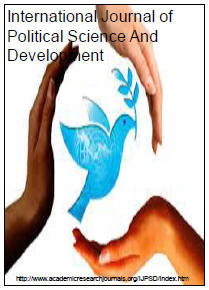| IJPSD |
International
Journal of Political Science and Development |
||||||||||||||||||||||
|
International Journal of Political Science and Development Vol. 3(2), pp. 101–107, February, 2015. DOI: 10.14662/IJPSD2015.011 ISSN: 2360-784X
Research Paper
THE NILE HYDRO POLITICS; A HISTORIC POWER SHIFT
Mohammed Yimer
Department of Civic and Ethical Studies, College of Social Sciences and Humanities, Arba Minch University. Email: muhamed_yimer@yahoo.com
Accepted 16 February 2015
An attempt is made to examine the ongoing political and economic changes
in the upstream countries (as well as in Sudan) and on how these
dynamics might affect and challenge both the regional balance of power
and the ongoing issue of hydro politics among the riparian states in the
Nile basin region. Nile basin is one of hot-spots where violent conflict
could break out over the shared water recourses because of various hydro
political intricacies that it involves. The intricacies that may lead to
conflict include: inequitable use of water resources, interstate
relations that are based on suspicion and misunderstanding, and
unilateral appropriation of the Nile waters. Using its hegemonic power
acquired for centuries and the myth of Herodotus, Egypt took the
monopoly of the Nile issue. Thus, until very recently, in equitable
distribution of water resources has been prevalent among the Nile basin
countries. The article tried to analyze the correlation between the
shifts in power relations in the Nile basin which started a decade ago.
It is indicated that these power changes have led to the development of
a new kind of relationship in which “no war, no peace “system is
preferred by the two riparian states, Egypt and Ethiopia. Avenues and
deriving forces for hydro political reform, such as the Nile Basin
Initiative, and the role of China and other donors or investors are not
to be unnoticed. In the contemporary era, one important phenomena that
has changed the Nile hydro politics is the emergence of China, a new
external trading partner to several of the Nile riparian states and a
country unencumbered with international water and environmental
regulations in its financing approach, has brought not only new
opportunities for dam construction in the Nile basin region but also new
challenges for hydro political relations. Cite This Article As: Yimer M (2015). THE NILE HYDRO POLITICS; A HISTORIC POWER SHIFT. Inter. J. Polit. Sci. Develop. 3(2): 101-107.
|
|
|||||||||||||||||||||
